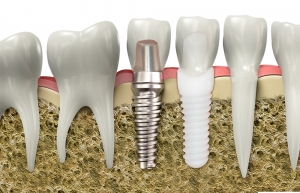Dental Implants

Although there is no equal substitute for your natural teeth, implants can provide a great treatment option to replace missing teeth. When considering tooth replacement, it is important to recognise that you have different options for appliances. Not every case is suitable for dental implants. For a singe missing tooth or small number of missing teeth, a dental bridge, partial denture or dental implants may be options. If you are missing an entire arch of teeth or have no teeth left, conventional full dentures or implant-supported dentures are options to consider. There are many factors to consider in determining whether you are a good candidate for dental implants. Eg. the thickness and density of the bone at the site requiring the implant, your medical history and habits. It is best to discuss with a dentist whether dental implants are a possibility in your particular case.
How Dental Implants can benefit you:
- Replacing a missing tooth with a dental implant can help to minimise bone loss in the region of the missing tooth. When a tooth's root is no longer present to stimulate the jawbone, the bone will shrink. This can compromise the quality of the bone in the vicinity, which can jeopardize the connection between the surrounding teeth and the jaw.
- Replacing missing teeth can prevent your remaining teeth from shifting to fill in the empty space left behind by missing teeth. If your remaining teeth shift too much, this can create a problem with malalignment. If you fail to replace a missing tooth in a timely manner, you may need to undergo orthodontic treatment if you end up with a crooked smile as a result.
- Replacement of your missing tooth (or teeth) can prevent debris and bacteria from collecting in the empty space/s and around other teeth which may have shifted as a result of the missing tooth. The more debris and bacteria which is allowed to accumulate in the mouth can increase risk of dental decay and periodontal disease.
- Dental implant treatment is conservative of your remaining teeth, as the placement of dental implants does not involve cutting down neighbouring teeth, which are often used as support teeth when constructing dental bridgework.
- Dental implants represent the most advanced and longest lasting tooth replacement technology available to patients. They offer a structurally complete prosthetic that includes both an artificial root, which is made of titanium (also available in ceramic), and a crown made of lifelike materials that mimic the appearance of enamel.
Choosing dental implants as a replacement for missing teeth means you have the benefit of stability in the jawbone and limited effects on surrounding teeth. It is also easier to maintain your oral hygiene with dental implants.
There are a wide range of types of implants and not all types of implants may be suitable for all patients.